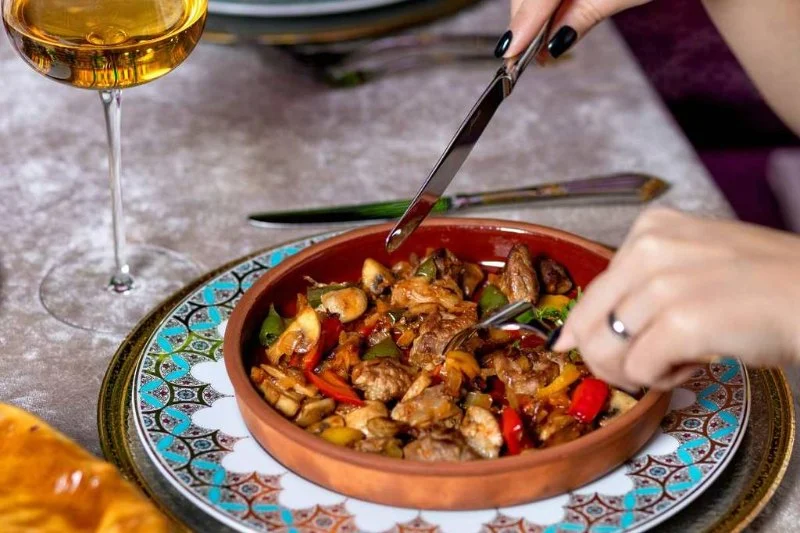
Exploring Middle Eastern Restaurants That Offer Chef’s Special Tasting Menus
- 1. Introduction to Middle Eastern Cuisine
- 2. The Concept of Chef’s Special Tasting Menus
- 3. Unique Flavors in Middle Eastern Tasting Menus
- 4. How Middle Eastern Restaurants Are Innovating with Tasting Menus
- 5. Examples of Middle Eastern Restaurants Offering Chef’s Special Tasting Menus
Middle Eastern cuisine is renowned for its rich, diverse flavors and vibrant spices. From the smoky aroma of grilled meats to the refreshing zest of citrus, the cuisine offers a dynamic range of tastes. It is influenced by a variety of cultures, with dishes that feature bold herbs like mint and parsley, exotic spices such as cumin and sumac, and ingredients like olive oil, yogurt, and chickpeas. In recent years, Middle Eastern restaurants have embraced modern dining trends, including tasting menus curated by skilled chefs. These tasting menus provide guests with a chance to experience a variety of dishes, offering a deeper dive into the complexity and beauty of Middle Eastern cuisine.
A chef’s special tasting menu is an innovative approach to dining, where the chef selects a curated set of dishes for the guest, typically featuring a series of smaller portions designed to showcase the restaurant's range of culinary skills. For Middle Eastern restaurants, tasting menus are an excellent way to introduce guests to traditional and modern dishes that represent the full spectrum of flavors the region has to offer. These menus often emphasize seasonal ingredients, regional specialties, and artistic plating to create an immersive dining experience. Whether the dishes are focused on seafood, grilled meats, or vegetable-based meals, the tasting menu gives guests an opportunity to explore diverse flavors in a single meal.
Middle Eastern tasting menus are distinguished by their vibrant use of spices and flavor profiles. Dishes often combine sweet, savory, and sour elements to create a harmonious balance. Popular flavors include the earthiness of cumin and coriander, the citrusy tang of sumac, and the heat of chili. Fresh herbs like mint, cilantro, and parsley add layers of freshness, while ingredients like tahini, yogurt, and pomegranate molasses bring richness and depth. The use of ingredients like lamb, chicken, and fish, often grilled or slow-cooked, adds a smoky, tender element to the meal. Many tasting menus also feature mezze, a selection of small appetizers, which allow diners to sample a variety of flavors in one sitting, including dishes like hummus, baba ganoush, falafel, and tabbouleh. The combination of spices and textures creates an exciting and satisfying dining experience.
Middle Eastern restaurants are increasingly incorporating modern cooking techniques and innovative twists on traditional recipes to create unique tasting menus. Sous-vide cooking, molecular gastronomy, and other modern methods are being used to enhance traditional dishes, offering new textures and presentations. For example, chefs may use liquid nitrogen to freeze pomegranate molasses, creating a crunchy texture, or incorporate smoked spices into a dish to add depth and complexity. Many restaurants also focus on sustainability by sourcing local, organic ingredients, adding an extra layer of meaning to the tasting experience. The innovation in these tasting menus allows diners to experience the flavors of the Middle East in a whole new light, combining tradition with cutting-edge culinary techniques.
Across the U.S., several Middle Eastern restaurants are leading the way with chef’s special tasting menus. Zahav in Philadelphia is one such example, offering a tasting menu that takes diners on a journey through Israel’s diverse culinary landscape. The restaurant’s dishes highlight seasonal ingredients and feature traditional flavors with a modern twist, like the famous hummus topped with pine nuts and a variety of grilled meats. In Los Angeles, Saffron & Rose combines Persian cuisine with innovative tasting menus, offering dishes like fesenjan (pomegranate walnut stew) paired with fresh herbs and saffron rice. Ilili in New York offers a Lebanese-inspired tasting menu that includes a range of mezze and mains, giving guests a chance to experience the varied flavors of the Middle East in a single meal. These restaurants are elevating Middle Eastern cuisine, offering tasting menus that blend tradition with creativity and innovation.







 NYC Deli & Bodega4.0 (38 reviews)
NYC Deli & Bodega4.0 (38 reviews) 纽约鱼市场 N.Y. Fish Market4.0 (87 reviews)
纽约鱼市场 N.Y. Fish Market4.0 (87 reviews) LANG QI CHINESE SEAFOOD RESTAURANT5.0 (2 reviews)
LANG QI CHINESE SEAFOOD RESTAURANT5.0 (2 reviews) FARIDA - Finest World Dishes4.0 (1763 reviews)
FARIDA - Finest World Dishes4.0 (1763 reviews) Cafe Mez4.0 (21 reviews)
Cafe Mez4.0 (21 reviews) Dunkin'4.0 (207 reviews)
Dunkin'4.0 (207 reviews) Where to Find the Best Spicy Tuna Sushi Rolls Near Me: A Fiery Japanese Favorite
Where to Find the Best Spicy Tuna Sushi Rolls Near Me: A Fiery Japanese Favorite Discovering Dessert Shops That Focus on Handmade and Artisan Techniques
Discovering Dessert Shops That Focus on Handmade and Artisan Techniques Exploring Vietnamese Restaurants and Their Signature Dishes
Exploring Vietnamese Restaurants and Their Signature Dishes How Ramen Restaurants Are Becoming Cultural Hotspots and Culinary Destinations
How Ramen Restaurants Are Becoming Cultural Hotspots and Culinary Destinations How Coffee Shops Are Creating Interactive Experiences for Guests Through Tastings and Workshops
How Coffee Shops Are Creating Interactive Experiences for Guests Through Tastings and Workshops How to Find the Best Brunch Buffets Near Me: A Food Lover’s Dream Come True
How to Find the Best Brunch Buffets Near Me: A Food Lover’s Dream Come True